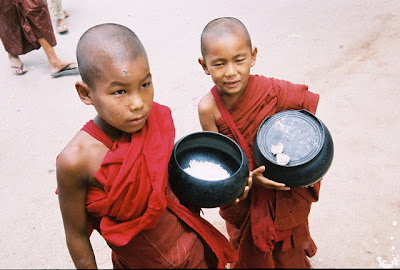Myanmar

You're packing a suitcase for a place none of us has been
A place that has to be believed to be seen
You could have flown away
A singing bird in an open cage
Who will only fly, only fly for freedom
Aung San Suu Kyi didn’t fly away when she could have.
She wasn’t there to accept her Nobel Peace prize in 1990. She wasn’t by her husband’s side when he died of cancer in 1999, and hasn’t been able to see her two sons since the 1980’s.
She stayed behind to be with her people – knowing full well that they would lock her away again.
It’s been 12 long years.
Walk on, walk on
What you got, they can't steal it
No they can't even feel it
Walk on, walk on
Stay safe tonight... They walked.
They walked.
They prayed.
They knew full well that they would be brutally murdered, as were thousands before them.
They offered blessings.
The first ones have been killed.
There will be more.
They weren’t safe last night, as hundreds of them were rounded up and taken away under the cover of darkness – but tomorrow they’ll walk on.
Two years ago, I traveled through Myanmar along with Eugene. It is a beautiful country of wonderful people cruelly oppressed by a remorseless military junta. “Imagine a city left five years ago by a colonial power. Now throw in 30 years of decay - and add a military dictatorship”, I wrote in my journal.
It is difficult to imagine that 45 years ago, this was one of the wealthiest countries in Asia.
We spoke to the people of freedom, and of the one they call their ‘lady’. We met two comedians who had spent six years in jail for telling jokes at the expense of the regime. And for two days, we spent time with the leader of a group of dissident monks we will call Z (I have no desire to get him in trouble). We ended up teaching a group of monks about democratic concepts, political science vocabulary, internet censorship and how to avoid it, and the history and success of non-violent protests.
Lectures on democracy
Is this Z in the Herald Tribune, leading the group of peacefully protesting monks, armed with a megaphone? (Update Sept 28th - the picture in the article has unfortunately been changed.) Was he or one of his apprentices among those killed in the protests yesterday? Am I to blame for people dying?

Then again, does it really matter?
Boys - not men - trained to kill.
Z will certainly have been among the tens of thousands of peaceful protestors on the streets – and I am sure that as he would not wish me to hope that the dozens killed were his neighbors, and not he. But it would be ridiculously self-important, indeed delusional, to assume that my touristic passage through the country had any effect on a major event in an ancient nation’s proud and complex history.
What I can do is try to prevent the issue from fading away once it becomes unfashionable, the way it has in the past.
“It is not power that corrupts but fear. Fear of losing power corrupts those who wield it and fear of the scourge of power corrupts those who are subject to it.”
- Aung San Suu Kyi
Lu Maw and his brother may not seem like much - but I respect anyone who spends six years in the notorious (and aptly named) "Insein Prison", and comes back out only to continue the political jibes that got them there.  Aung San Suu Kyi was two years old when her father was assassinated - the same year he won independence for Burma from Britain. Are these children next?
Aung San Suu Kyi was two years old when her father was assassinated - the same year he won independence for Burma from Britain. Are these children next? How young is too young?
How young is too young? Bagan Beauty
Bagan Beauty
Credits:
Some of the pictures are Eugene's - the rest of his photos from the trip can be found here.
The lyrics quoted are from U2's ode to Aung San Suu Kyi, "Walk On" - click here below to listen:




